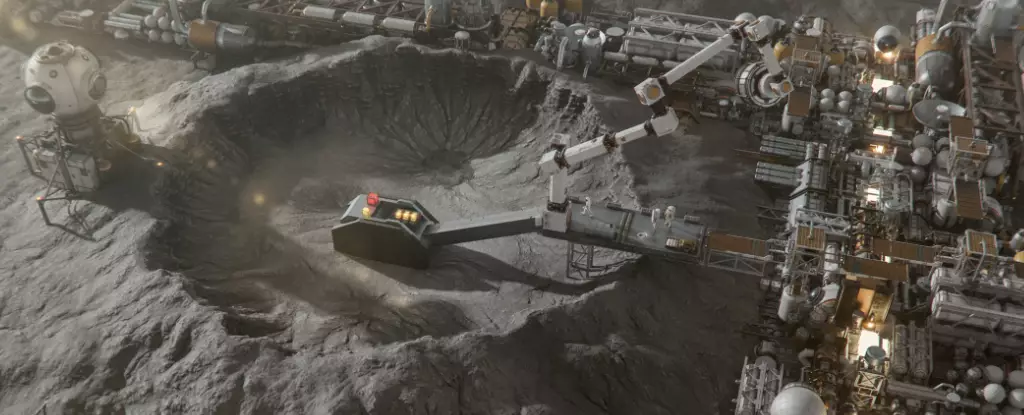As we advance further into the 21st century, an ambitious vision is unfolding—a vision in which human beings are not only exploring but also mining the Moon. With groundbreaking projects like NASA’s Artemis program and parallel efforts by nations such as China, the Moon is becoming a focal point of exploration and economic potential. This burgeoning interest in lunar mining, however, calls for a reflective pause. The commercial activities planned on the Moon necessitate the development of comprehensive regulations that can safeguard the interests of humanity as a whole. The question of ethics and governance looms larger than ever in this new frontier.
The economic impetus for lunar mining is compelling. Currently, all resources intended for space exploration are expensive to transport from Earth. The staggering cost of sending even a liter of water to the Moon makes it more precious than gold. However, the Moon is rich in resources like water ice and rare Earth metals, which could be harnessed to create fuel and provide materials essential for advanced technology. The feasibility of converting lunar water into hydrogen and oxygen could revolutionize space travel, allowing spacecraft to refuel on the Moon itself and facilitating deeper missions to other celestial bodies, including Mars.
Moreover, the extraction of valuable minerals from the Moon could help alleviate the escalating pressure on Earth’s own limited resources. Such prospects are enticing for both private enterprises and governmental space agencies that aim to sustain their exploratory activities through local resource utilization. Yet, the pervasive enthusiasm surrounding these opportunities must not overshadow the ethical implications and potential risks.
Although the Moon may appear as a barren wasteland, it is a delicate ecosystem that could be irreparably altered by human intervention. Particularly concerning is the effect of lunar dust, which, when disturbed, has the potential to spread widely across the surface. This “space weathering” process could visually impact the Moon’s surface, with dust clouds obscuring reflective patches and older, more reflective material becoming buried beneath a veil of contamination. Effective management of this dust is essential for minimizing environmental damage and preserving the Moon’s aesthetic and scientific value.
The presumption that lunar mining can occur without environmental repercussions is naïve and reminiscent of the challenges Earth has faced due to industrial pollution. As private companies race to develop mining technologies, the urgency for sustainable and responsible practices is paramount.
The legal landscape surrounding lunar mining is complex and fraught with contradictions. The Outer Space Treaty of 1967 explicitly prohibits nations from claiming ownership of celestial bodies, establishing a framework for international cooperation. Nonetheless, the Moon Treaty of 1979 advocates for the Moon’s resources to be considered the “common heritage of mankind,” which complicates the legality of commercial mineral extraction. In contrast, the Artemis Accords initiated in 2020 appear to allow for lunar resource extraction while still adhering to the non-appropriation tenets of the Outer Space Treaty. The resulting legal ambiguity raises critical questions about who will benefit from lunar mining efforts, particularly regarding equitable access to resources among nations.
Understanding these legal frameworks is crucial as they will play a significant role in shaping the future of lunar activities and ensuring that the benefits of space exploration are shared fairly.
Beneath the excitement and promises of technological advancement lies a more sobering reality—the potential hardships faced by lunar miners themselves. Operating in a low-gravity environment poses significant health risks, including exposure to cosmic radiation and exacerbated psychological stresses from isolation. The dystopian vision of miners enduring unsafe work conditions without the option for redress is troubling, particularly with the absence of regulatory bodies to enforce worker rights.
Concerns regarding the potential exploitation of labor in space emphasize the need for strong governance and laws that protect the workers undertaking these hazardous tasks. A careful balance must be struck to ensure that the pursuit of profits does not result in compromising human dignity and safety.
As we stand on the brink of a new era in space exploration, it is imperative we learn from the past. The history of resource exploitation on Earth has often led to detrimental social and environmental outcomes. Before embarking on lunar mining, it is vital that we put robust regulations in place, ones that prioritize fairness, safety, and the protection of human rights.
Creating a sustainable and equitable framework for lunar mining is not merely an option but a necessity for protecting the shared interests of humans both on Earth and beyond. The Moon should serve as a beacon of inspiration for generations to come, not just a lucrative resource hub. It is time to ensure that our ventures into space are conducted with foresight and responsibility.

